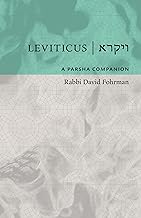Leviticus: A Parsha Companion by David Fohrman; Jerusalem: Aleph Beta Press; © 2024; ISBN 9781592-646777; $29.95
By Rabbi Dr. Israel Drazin

 PIKESVILLE, Maryland — In this third excellent volume of Rabbi David Fohrman’s Parasha Companion series, Leviticus, which follows Genesis and Exodus, the rabbi raises interesting questions, offers possible answers, makes the biblical book Leviticus meaningful, and causes us to think. Without the rabbi’s help, Leviticus is difficult to understand and relate to the modern age. Rabbi Fohrman overcomes this obstacle.
PIKESVILLE, Maryland — In this third excellent volume of Rabbi David Fohrman’s Parasha Companion series, Leviticus, which follows Genesis and Exodus, the rabbi raises interesting questions, offers possible answers, makes the biblical book Leviticus meaningful, and causes us to think. Without the rabbi’s help, Leviticus is difficult to understand and relate to the modern age. Rabbi Fohrman overcomes this obstacle.
The book is remarkably easy to read. It is entertaining and eye-opening. He tells us that Leviticus contains a “treasure trove of interesting connections. In law after law, passage after passage, Leviticus picks up threads in Genesis and Exodus and weaves them into rich tapestries of meaning; indeed, contrary to appearances, Leviticus is emphatically not a book that stands alone.” He introduces us to a game, “Where did I hear these words before? It shows us that by doing so, we can see Leviticus is not two but three-dimensional. He gives us a new, exciting, and deeper view of Leviticus.
Regarding the weekly biblical portion Tzav, Rabbi Fohrman tells us that the Talmudic rabbis in Berachot 54b identify four types of people required to offer Thanksgiving Offerings. Three of the four are similar, but the fourth stands out. He introduces us to a Sesame Street game, “One of the things is not like the others.” He shows us this is not only a simple childish game but a delightful educational one, even for adults. (The technique is used in IQ tests.) Using the game, he shows quite a few lessons that the portion Tzav teaches us that are relevant today. They make us better people.
*
Rabbi Dr. Israel Drazin is a retired brigadier general in the U.S. Army Chaplain Corps and the author of more than 50 books.